Top 10 Foods Highest in Beta Carotene
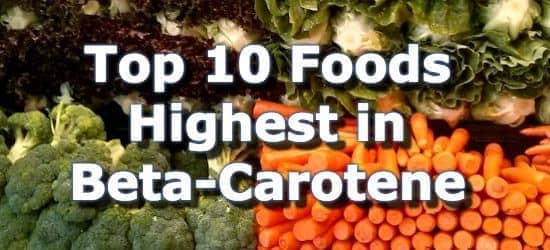
Beta-carotene is a carotenoid compound responsible for giving fruits and vegetables their orange pigment.
Beta-carotene is a fat-soluble vitamin, so eating it along with foods with fat such as olive oil or nuts, can help to boost absorption. (1)
Like alpha-carotene, beta-carotene is a precursor for creating vitamin A in the body. The amount of vitamin A is measured in retinol activity equivalents (RAE). (2) The current daily value for vitamin A is 900mcg of RAE. (3)
There is no official recommended daily allowance (RDA) for beta-carotene, but a figure of 10800mcg per day can be used as a general target. This is based on the rate of conversion of beta-carotene into vitamin A. It takes 12mcg of beta-carotene to create 1mcg of RAE. (2)
Foods high in beta-carotene include sweet potatoes, carrots, dark leafy greens, butternut squash, cantaloupe, lettuce, red bell peppers, apricots, broccoli, and peas.
Below is a list of the 10 best beta-carotene foods. Use the nutrient ranking of over 200 foods high in beta-carotene to sort by 100 gram serving sizes and find even more foods.
List of Foods High in Beta-Carotene
-
 1. Baked Sweet Potatoes + Add
1. Baked Sweet Potatoes + Add
Beta-carotene
per CupBeta-carotene
per 100gBeta-carotene
per 200 Calories23018mcg
(213% RDA)11509mcg
(107% RDA)25576mcg
(237% RDA)See all vegetables high in beta-carotene.
-
 2. Carrots + Add
2. Carrots + Add
Beta-carotene
per Cup CookedBeta-carotene
per 100gBeta-carotene
per 200 Calories12998mcg
(120% RDA)8332mcg
(77% RDA)47611mcg
(441% RDA) -
 3. Dark Leafy Greens (Spinach) + Add
3. Dark Leafy Greens (Spinach) + Add
Beta-carotene
per Cup CookedBeta-carotene
per 100gBeta-carotene
per 200 Calories11318mcg
(105% RDA)6288mcg
(58% RDA)54678mcg
(506% RDA)More Dark Leafy Greens High in Beta-Carotene
- 98% RDA in 1 cup of cooked kale
- 96% RDA in 1 cup of cooked mustard greens
- 79% RDA in 1 cup of cooked collards
- 61% RDA in 1 cup of cooked beet greens
- 59% RDA in 1 cup of cooked Swiss chard
See all vegetables high in beta-carotene.
-
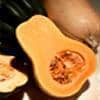 4. Butternut Squash + Add
4. Butternut Squash + Add
Beta-carotene
per Cup CookedBeta-carotene
per 100gBeta-carotene
per 200 Calories9369mcg
(87% RDA)4570mcg
(42% RDA)22850mcg
(212% RDA) -
5. Cantaloupe + Add
Beta-carotene
per CupBeta-carotene
per 100gBeta-carotene
per 200 Calories3575mcg
(33% RDA)2020mcg
(19% RDA)11882mcg
(110% RDA)See all fruits high in beta-carotene.
-
6. Romaine Lettuce + Add
Beta-carotene
per CupBeta-carotene
per 100gBeta-carotene
per 200 Calories2456mcg
(23% RDA)5226mcg
(48% RDA)61482mcg
(569% RDA) -
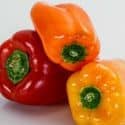 7. Red Bell Peppers + Add
7. Red Bell Peppers + Add
Beta-carotene
per Cup CookedBeta-carotene
per 100gBeta-carotene
per 200 Calories2059mcg
(19% RDA)1525mcg
(14% RDA)10893mcg
(101% RDA)- 3% DV in 1 cup of cooked green bell peppers
See the complete nutrition comparison of red vs green bell peppers.
-
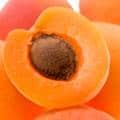 8. Apricots + Add
8. Apricots + Add
Beta-carotene
per CupBeta-carotene
per 100gBeta-carotene
per 200 Calories1696mcg
(16% RDA)1094mcg
(10% RDA)4558mcg
(42% RDA)More Fruits High in Beta Carotene
- 15% RDA in 1 cup of pink grapefruit
- 10% RDA in 1 cup of mangoes
- 6% RDA in 1 cup of guavas
See all fruits high in beta-carotene.
-
 9. Broccoli + Add
9. Broccoli + Add
Beta-carotene
per Cup CookedBeta-carotene
per 100gBeta-carotene
per 200 Calories1449mcg
(13% RDA)929mcg
(9% RDA)5309mcg
(49% RDA) -
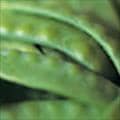 10. Podded Peas + Add
10. Podded Peas + Add
Beta-carotene
per Cup CookedBeta-carotene
per 100gBeta-carotene
per 200 Calories1216mcg
(11% RDA)760mcg
(7% RDA)2923mcg
(27% RDA)
Where does the RDA for Beta-Carotene come from?
The Recommended Dietary Allowance (RDA) is the average daily requirement for a particular nutrient.
The daily value (%DV) for an vitamin A is 900mcg RAE (retinol equivalents). (3)
For beta-carotene from foods, 12 mcg of beta-carotene is converted to 1mcg RAE (vitamin A) in the body. (2) This means that the the RDA for beta-carotene is equal to the %DV for vitamin A times 12. We use the 900mcg DV to set the RDA for beta-carotene, so it is 900mcg x 12 = 10800mcg (10.8mg). This is the amount that you would need if you were getting all of your vitamin A in the form of beta-carotene.
The 10800mcg can be used for comparison purposes and is not necessarily a target amount to eat in a day. This is because the target is a total of 900mcg RAE. Other sources of RAE, including alpha-carotene and vitamin A, contribute to this total.
From the Nutrient Ranking Tool
Use the ranking tool links below to select foods and create your own food list to share or print.
- Foods High in Beta Carotene
- Foods Low in Beta Carotene
- Vegetables High in Beta Carotene
- Fruits High in Beta Carotene
- Vegetarian Foods High in Beta Carotene
- Dairy High in Beta Carotene
- Breakfast Cereals High in Beta Carotene
- Fast Foods High in Beta Carotene
View more nutrients with the nutrient ranking tool, or see ratios with the nutrient ratio tool.
Related
Data Sources and References
- Ribaya-Mercado JD. Bioavailability of beta-carotene in humans Nutr Rev. 2002 Apr;60(4):104-10. doi: 10.1301/00296640260085831. 12002680
- National Library of Medicine - Dietary Reference Intakes for Vitamin A, Vitamin K, Arsenic, Boron, Chromium, Copper, Iodine, Iron, Manganese, Molybdenum, Nickel, Silicon, Vanadium, and Zinc.
- U.S.FDA - Daily Value on the New Nutrition and Supplement Facts Labels
Simplify Nutrition Tracking with MyFoodData!
Speedy Tools and Detailed Data FREEEasily analyze your meals to find the best foods for your goals.
✅ Use our recipe nutrition calculator and nutrition comparison tool.
✅ Access expert nutrition data tools and in-depth articles.
✅ Log foods and organize your recipes with a free account.


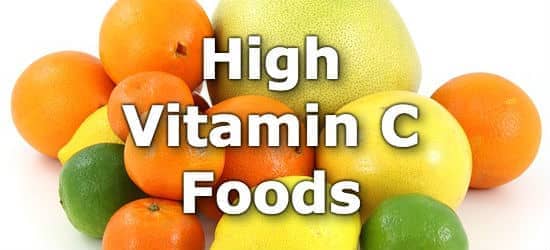 Next ➞
Next ➞
